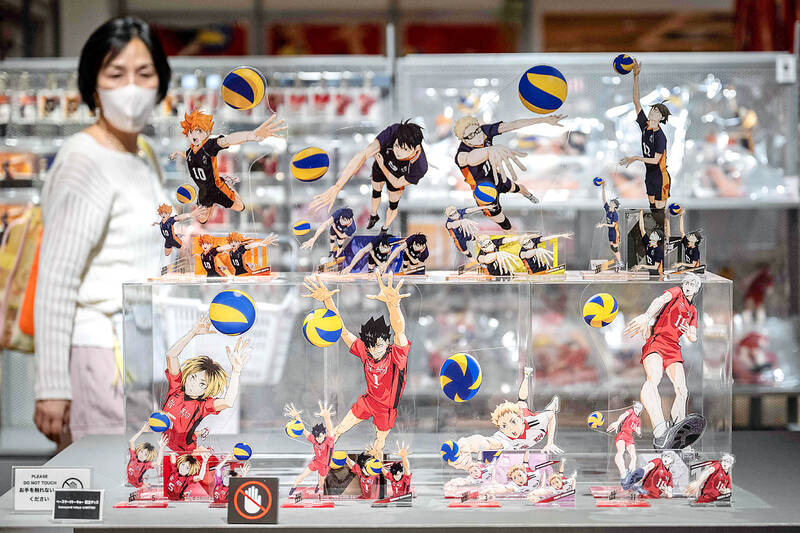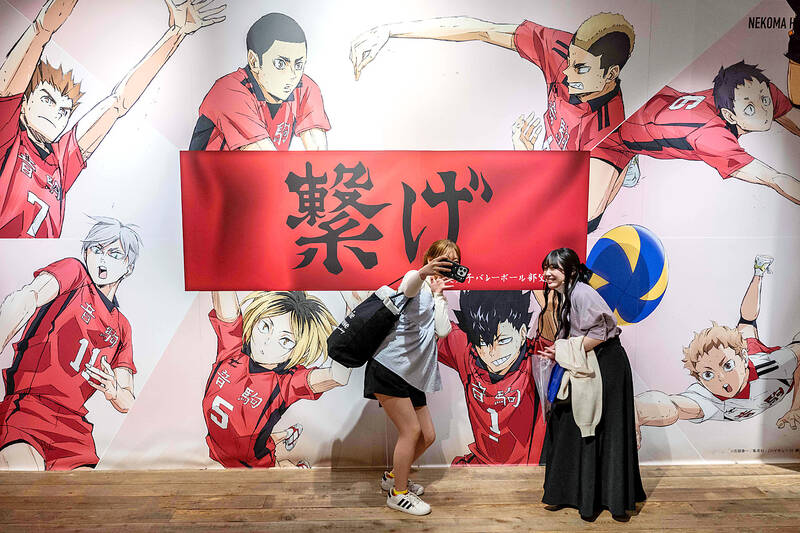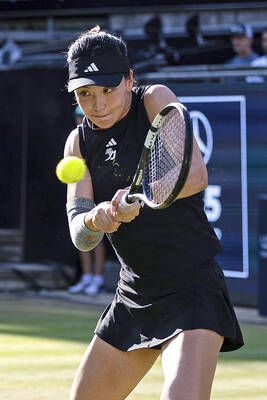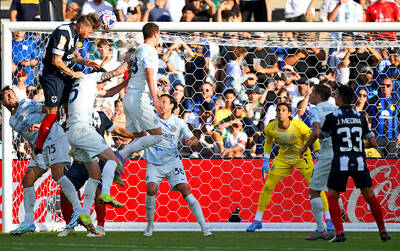Men’s volleyball is flying high in Japan with the national team ranked fourth globally ahead of the Paris Olympics with the sport’s soaring popularity fueled by a manga blockbuster.
Haikyu!!, the tale of school teams featuring an inspirational comic-book hero determined to beat the odds and his diminutive stature, has sold 60 million copies since its 2012 inception.
Turned into a hit anime series, now a film Haikyu!!: The Dumpster Battle has taken ¥10 billion (US$64.2 million) at the Japanese box office and is to be released in North America this month.

Photo: AFP
Masahiro Yanagida, who captained the national team from 2018 to 2021, said he was “immensely grateful” that the exploits of the fictional team have helped trigger a boom in numbers hitting the courts.
“I have all volumes of the manga myself,” he said, recalling being “completely hooked” on its “pretty realistic” depictions of the sport.
High-school volleyball club membership for boys soared from 35,000 in 2012 to more than 50,000 this year, official records showed.

Photo: AFP
Among those inspired is Kaede Sakashita, 10, seeking to emulate Haikyu!! elite setter Atsumu Miya, and his low-lunge toss, in a Tokyo sports hall.
“He’s my role model,” said Sakashita, a member of Tokyo’s Sugiichi junior volleyball club.
The Haikyu!! fandom goes beyond boys.

Photo: AFP
For Nanami Fujiki, 22, the manga ignited her “love” for the sport.
“I used to have no interest at all... I didn’t even know the rules,” she said at a pop-up store selling Haikyu!! merchandise.
Thanks to the series, “I can enjoy the actual matches in a way I never did before,” she said.
The national team has a real-life echo of the comic in star players like Ran Takahashi, a wildly popular 22-year-old playing in Italy’s top league.
Despite not being tall by volleyball standards, the 1.88m outside hitter stunned the world last year with a pirouetting spike with his back to the net — just like a character in Haikyu!!.
“Thanks perhaps to Haikyu!!, I feel the visually entertaining plays of Japanese volleyball are riveting spectators worldwide more and more,” Takahashi said. “Some may say the quality of Japanese volleyball is approaching anime.”
Japan’s glory days in volleyball date back more than half a century. The women’s team, the “Oriental Witches,” famously defeated the Soviet Union to win gold at the 1964 Tokyo Olympics, followed by the men’s “Miracle in Munich” gold medal in 1972.
The women have fared better since, winning bronze at the 2012 London Olympics, although they have not qualified for Paris yet.
The men “stagnated for ages,” Japan Volleyball Association spokesman Naohiro Kakitani said.
The turning point came with players such as Takahashi and Yuki Ishikawa, 28, foraying into Italy’s top league, along with the team’s transformation since the 2017 arrival of French coach Philippe Blain, Kakitani added.
Last year, Blain’s squad finished third at the FIVB Volleyball Men’s Nations League, their first men’s medal at a major international tournament in 46 years.
“They’re now on a whole different level that I wouldn’t have dreamed of in our time,” Yanagida said.
The sport still has challenges, with critics pointing to the poor profitability of Japan’s top-level V.League.
It features many company-backed teams whose players do not rely on volleyball for a living and can therefore be less motivated, Yanagida said.
Breaking the mold is Yanagida’s current club, Tokyo Great Bears.
Donning pink uniforms, they are “actively shedding an aggressive, macho image” often associated with male athletes, to ensure “female fans wouldn’t feel ignored,” club president Takeshi Kubota said.
This approach, combined with deals with YouTubers and musicians, helped Tokyo Great Bears lure the biggest crowds in the men’s division for two straight years.
“We wanted to prove volleyball can draw crowds,” Kubota said.
It is a mindset that resonates with Takahashi, who willingly makes himself a volleyball poster boy by modeling and singing on YouTube.
“I want to make volleyball a sport children can dream of,” he said.

Brazil has four teams, more than any other country, in the expanded Club World Cup that kicked off yesterday in the US, but for SE Palmeiras, the competition holds a special meaning: winning it would provide some redemption. Under coach Abel Ferreira since 2020, Palmeiras lifted two Copa Libertadores titles, plus Brazilian league, cup and state championships. Even before Ferreira, it boasted another South American crown and 11 league titles. The only major trophy missing is a world champions’ title. Other Brazilian clubs like Fluminense FC and Botafogo FR, also in the tournament, have never won it either, but the problem for Palmeiras

Lionel Messi drew vast crowds and showed flashes of his brilliance when his Inter Miami side were held to a goalless draw by African giants Al-Ahly as the revamped FIFA Club World Cup got off to a festive start on Saturday. Fans showed up en masse for the Group A clash at the Hard Rock Stadium, home to the NFL’s Miami Dolphins, but Messi could not fully deliver, his best chance coming through a last-second attempt that was deflected onto the crossbar. Inter Miami next face FC Porto on Thursday in Atlanta, while Al-Ahly, who benefited from raucous, massive support, are to

Twelve days after winning her second Grand Slam title at the French Open, Coco Gauff fell at the first hurdle on grass in Berlin on Thursday as beaten Paris finalist Aryna Sabalenka advanced to the quarter-finals. Recipient of a first round bye, American Gauff lost 6-3, 6-3 to Chinese qualifier Wang Xinyu as world number one Sabalenka beat Rebeka Masarova 6-2, 7-6 (8/6) in her second round tie. Winner of 10 main tour titles, including the US Open in 2023 and the WTA Finals last year, Gauff has yet to lift a trophy in a grass-court tournament. “After I won the first

Sergio Ramos on Tuesday outfoxed two Inter players and artfully headed home the first goal for Monterrey at the FIFA Club World Cup. The 39-year-old Ramos slipped through the penalty area for the score just as he did for so many years in the shirts of Real Madrid and Spain’s national team, with whom he combined smarts, timing and physicality. Ramos’ clever goal and his overall defensive play at the Rose Bowl were major factors in Monterrey’s impressive 1-1 draw against the UEFA Champions League finalists in the clubs’ first match of the tournament. “There is always a joy to contribute to the